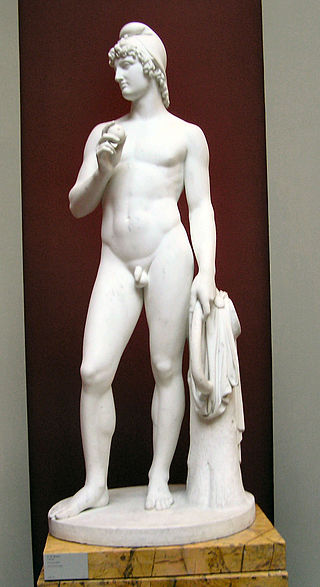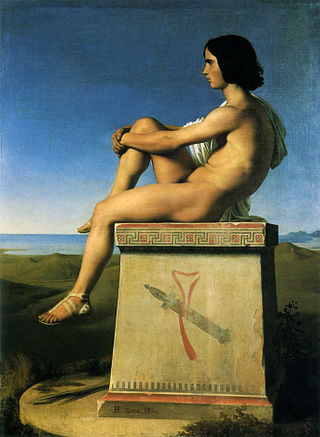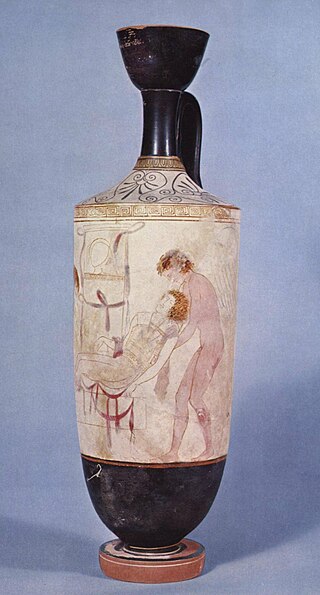
In Greek mythology, Priam was the legendary and last king of Troy during the Trojan War. He was the son of Laomedon. His many children included notable characters such as Hector, Paris, and Cassandra.

Troy or Ilion was an ancient city located in present-day Hisarlik, Turkey. It is best known as the setting for the Greek myth of the Trojan War. The archaeological site is open to the public as a tourist destination, and has been added to the UNESCO World Heritage list as of 1998.

Paris, also known as Alexander is a mythological figure in the story of the Trojan War. He appears in numerous Greek legends and works of Ancient Greek literature such as the Iliad. In myth, he is prince of Troy, son of King Priam and Queen Hecuba, and younger brother of Prince Hector. His elopement with Helen sparks the Trojan War, during which he fatally wounds Achilles.

Helen of Troy, Helen, Helena, also known as beautiful Helen, Helen of Argos, or Helen of Sparta, was a figure in Greek mythology said to have been the most beautiful woman in the world. She was believed to have been the daughter of Zeus and Leda, and was the sister of Clytemnestra, Castor and Pollux, Philonoe, Phoebe and Timandra. She was married to King Menelaus of Sparta "who became by her the father of Hermione, and, according to others, of Nicostratus also." Her abduction by Paris of Troy was the most immediate cause of the Trojan War.

The Dardanoi were a legendary people of the Troad, located in northwestern Anatolia. The Dardanoi were the descendants of Dardanus, the mythical founder of Dardanus, an ancient city in the Troad. A contingent of Dardanians figures among Troy's allies in the Trojan War. Homer makes a clear distinction between the Trojans and the Dardanoi, however, "Dardanoi"/"Dardanian" later became essentially metonymous–– or at least is commonly perceived to be so–– with "Trojan", especially in the works of Vergil such as the Aeneid.
In Greek mythology, there were at least three people named Thymoetes.

Alaksandu, alternatively called Alakasandu or Alaksandus was a king of Wilusa who sealed a treaty with Hittite king Muwatalli II ca. 1280 BC. This treaty implies that Alaksandu had previously secured a treaty with Muwatalli's father, Mursili II, as well. His name appears to be of Ancient Greek origin.
In Greek mythology, Antenor was a counselor to King Priam of Troy during the events of the Trojan War.

The historicity of the Iliad has been a topic of scholarly debate for centuries. While researchers of the 18th century had largely rejected the story of the Trojan War as fable, the discoveries made by Heinrich Schliemann at Hisarlik reopened the question. The subsequent excavation of Troy VIIa and the discovery of the toponym "Wilusa" in cuneiform Hittite correspondence has made it plausible that the Trojan War cycle was at least remotely based on a historical conflict of the 12th century BC, even if the poems of Homer remembered the event only through the distortion of four centuries of oral tradition.
Troy in the Late Bronze Age was a thriving coastal city consisting of a steep fortified citadel and a sprawling lower town below it. It had a considerable population and extensive foreign contacts, including with Mycenaean Greece. Geographic and linguistic evidence suggests that it corresponds to the city of Wilusa known from Hittite texts. Its archaeological sublayers Troy VIh and Troy VIIa are among the candidates for a potential historical setting for the myths of the Trojan War, since aspects of their architecture are consistent with the Iliad's description of mythic Troy and they show potential signs of violent destruction.
The Trojan language was the language spoken in Troy during the Late Bronze Age. The identity of the language is unknown, and it is not certain that there was one single language used in the city at the time.

The Trojan Battle Order or Trojan Catalogue is an epic catalogue in the second book of the Iliad listing the allied contingents that fought for Troy in the Trojan War. The catalogue is noted for its deficit of detail compared to the immediately preceding Catalogue of Ships, which lists the Greek contingents, and for the fact that only a few of the many Trojans mentioned in the Iliad appear there.
Trevor Robert Bryce is an Australian Hittitologist specializing in ancient and classical Near-eastern history. He is semi-retired and lives in Brisbane.
Apaliunas is the name of a god, attested in a Hittite language treaty as a protective deity of Wilusa. Apaliunas is considered to be the Hittite reflex of *Apeljōn, an early form of the name Apollo, which may also be surmised from comparison of Cypriot Ἀπείλων (Apeílōn) with Doric Ἀπέλλων (Apéllōn).

James Henry Weldon Morwood was an English classicist and author. He taught at Harrow School, where he was Head of Classics, and at Oxford University, where he was a Fellow of Wadham College, and also Dean. He wrote almost thirty books, ranging from biography to translations and academic studies of Classical literature.

In Greek mythology, Polites was the legitimate son of King Priam and Queen Hecuba and was known for his swiftness. He was a prince of Troy, and brother of 49 other children, including 12 daughters. He was killed by Neoptolemus (Pyrrhus), son of Achilles, who then killed his father. He is also known by his family as "defender of Troy."
Barbara Elizabeth Goff is a Classics Professor at the University of Reading. She specialises in Greek tragedy and its reception; women in antiquity; postcolonial classics and reception of Greek political thought.

Troilus and Cressida is a play by William Shakespeare, probably written in 1602.

In Greek mythology, Sarpedon was a son of Zeus, who fought on the side of Troy in the Trojan War. Although in the Iliad, he was the son of Zeus and Laodamia, the daughter of Bellerophon, in the later standard tradition, he was the son of Zeus and Europa, and the brother of Minos and Rhadamanthus, while in other accounts the Sarpedon who fought at Troy was the grandson of the Sarpedon who was the brother of Minos.
Ruby Blondell is Professor Emerita of Classics and Adjunct Professor Emerita of Gender, Women, & Sexuality Studies at the University of Washington; prior to retirement, they were the Byron W. and Alice L. Lockwood Professor of Humanities also at the University of Washington. Their research centres on Greek intellectual history, gender studies, and the reception of ancient myth in contemporary culture.











